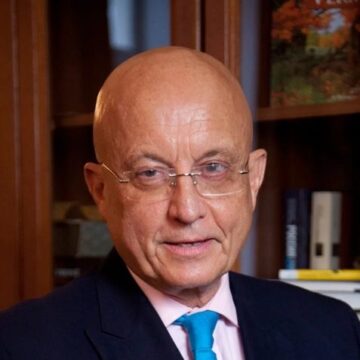Originally published in Financial times 14 September 2014.
The Soviet Union’s sunset years hardly felt like an innocent age to those who lived through them, but to recall the hopes and aspirations of that era is to rue the naiveties of those days. “A common European house” was how President Mikhail Gorbachev pictured the continent’s future; “a Europe whole and free”, in the words of George HW Bush, his American counterpart. But, as the tussle over Ukraine has shown, Russia and the west are rivals once again. The ceasefire signed on September 5 gives both sides a chance to overcome their own illusions. They should take it, lest the conflict become a direct military confrontation.
Western leaders seem to believe their own propaganda. A failed Ukraine, they suggest, could be cradled into western Europe and become democratic and prosperous – and maybe it could, if they waited 20 years and could count on energetic support from Russia. But Moscow, they are convinced, is hell-bent on grabbing land, a hunger from which it can be distracted only through the infliction of pain. Hence the sanctions, the war of disinformation and the reinvigoration of Nato as a military force.
It is a strategy that rests on misunderstanding and miscalculation. The misunderstanding is that this is, at root, a stand-off over Ukraine. To Russians, it is something far more important: a struggle to stop others expanding their sphere of control into territories they believe are vital to Russia’s survival.
It is a miscalculation because Russia is far stronger, and the west far weaker, than many imagine. The west that Russia now faces is not the self-confident alliance that proclaimed itself victor of the cold war. It is a directionless gaggle, beset with economic insecurities and losing sight of its moral convictions. America and its allies once held the future in their hands, but at the beginning of this Asian century they have let it slip through their fingers. Their crowning accomplishment was globalisation – and they are destroying it, with economic sanctions they incoherently describe as instruments of self-defence.
These sanctions will hurt ordinary Russians, but they are helping to rouse our country from its slumber. True, Russia is smaller than the Soviet Union was, and a romantic belief in the free market has led it to take some wrong turns. The country’s elite, enjoying the consumerist pleasures afforded by new wealth, had long been at rest. But President Vladimir Putin has studied the lessons of history and harbours no illusions about the west. Russian citizens, unlike the disillusioned Soviets who were never far from hunger, know what they are ready to struggle for. Our country is finding its place. Compare the Soviet armed forces, lumbering and expensive, with the nimble military of modern Russia.
A small minority of my compatriots oppose Moscow’s hard line. Twenty years ago it was the reverse: a minority opposed rapprochement with the west. But that was before the west rediscovered the politics of Versailles and decided Russia had to be stopped at all costs. With encouragement, these foreign powers imagined, the new bourgeoisie would revolt against Mr Putin. Instead, they are rallying around him.
State propaganda plays a role, but Russians have access to western media via the internet and the more of it they see the more they unite around the Kremlin. This is no time for denial: westerners need to understand how their governments made a potential foe out of what was once an aspiring ally. Russia will not yield. This has become a matter of our nation’s life and death.
A lasting peace in Europe is a noble aim. It can be achieved only through mutual respect and an accommodation of legitimate interests. Even for a europhile such as me, it will be hard to argue for political union with a Europe that is abandoning, one hopes temporarily, Christianity and traditional norms. But our goal must be to create a common space in which people, capital and energy can move freely between Europe, with its old ties to the US, and a Russia that is embracing Asia.
Meanwhile, we must avoid visiting the horrors of war on the people of Ukraine. If we fail to do that, we will have abandoned another European value: reason.










